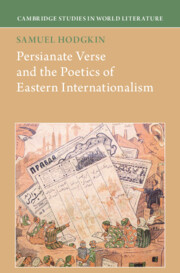Book contents
- Persianate Verse and the Poetics of Eastern Internationalism
- Cambridge Studies in World Literature
- Persianate Verse and the Poetics of Eastern Internationalism
- Copyright page
- Contents
- Figures
- Acknowledgments
- Technical Note: Translation, Transliteration, and Dates
- Introduction
- Chapter 1 Tribunes
- Chapter 2 Canons
- Chapter 3 Occasions
- Chapter 4 Translations
- Chapter 5 Recognitions
- Conclusion
- Appendix: A Commemorative Compendium (Tazkira) of Writers, Scholars, Bureaucrats, and Saints
- Notes
- Bibliography
- Index
Introduction
Persianate/Eastern/International: Geographies, Forms, Periodizations
Published online by Cambridge University Press: 14 December 2023
- Persianate Verse and the Poetics of Eastern Internationalism
- Cambridge Studies in World Literature
- Persianate Verse and the Poetics of Eastern Internationalism
- Copyright page
- Contents
- Figures
- Acknowledgments
- Technical Note: Translation, Transliteration, and Dates
- Introduction
- Chapter 1 Tribunes
- Chapter 2 Canons
- Chapter 3 Occasions
- Chapter 4 Translations
- Chapter 5 Recognitions
- Conclusion
- Appendix: A Commemorative Compendium (Tazkira) of Writers, Scholars, Bureaucrats, and Saints
- Notes
- Bibliography
- Index
Summary
At the twentieth-century height of literary nationalisms, leftist internationalists from across Eurasia bonded over their shared love of the classical Persian poets. At writers’ congresses and in communist and third-worldist literary journals, the poets of Turkey, Iran, Afghanistan, South Asia, and Soviet Central Eurasia addressed each other in ghazals and ruba‘iyat that affirmed their friendship and solidarity. This book shows how Persian poetry became a commons for Eastern internationalism in the early twentieth century, just as the last Persianate empires dissolved into new nation-states and Soviet republics. It considers the relationship between national literatures and internationalism in Eurasia over the course of the century when the fates of communism and the Persian cultural heritage were intimately linked. The result is a proper accounting of the modern fate of Persianate culture. The disruptive effects of nationalization and vernacularization, usually understood as the end of the Persianate, here become legible as a process of sublation that turned the transnational community of Persophone writers and readers into the constituency for a distinctively Eastern internationalism. In the archive of poetry and criticism that this community produced, Persianate Verse finds a vital alternative to world literature as we know it.
- Type
- Chapter
- Information
- Publisher: Cambridge University PressPrint publication year: 2023

